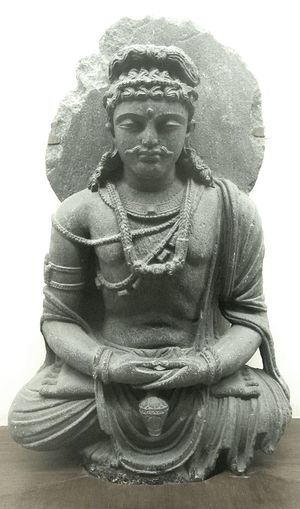Virya

In Buddhist teachings virya is one of the ten paramitas (“perfect virtues” or “highest perfections”) that one must practice and perfect as a prerequisite to the attainment of Bodhisattvahood. Virya has been translated as “strength,” “energy,” “strenuousness,” “manliness,” “zeal,” “courage,” “power,” “diligence,” or “vigor.”
This “active compassion” of the Bodhisattva, embracing both fearlessness and virya, finds its ultimate expression as forgiveness. It is impossible to extend compassion to someone if you have not first forgiven him for his transgressions. And in order to be charitable or forgiving, you need virya. If you don’t have strength, you have nothing to give—you don’t even have the energy to forgive. It takes strength to fulfill your own needs and then have something left over to give to others.
Har Dayal, in his compendium on The Bodhisattva Doctrine in Buddhist Sanskrit Literature, writes:
The Dhamma-sangani defines it thus: “The striving and onward effort, the exertion and endeavour, the zeal and ardour, the vigour and fortitude, the state of unfaltering effort, the state of sustained desire, the state of not putting down the yoke and the burden, the solid grip of the yoke and the burden, energy, right endeavour, this is virya.”...
Virya is often praised by the Mahayanist writers, and its fundamental importance is indicated in unequivocal terms. Enlightenment depends entirely on virya; where there is virya, there is bodhi. Virya is the chief and paramount cause of all the auspicious principles that are conducive to Enlightenment. It promotes a bodhisattva’s material and spiritual well-being. It is far better to live only for a day with full virya than to vegetate without energy during a hundred years.[1]
Helena Roerich, who in the 1920s began releasing the teachings of El Morya through the Agni Yoga books, wrote of Maitreya and the path of the Bodhisattva. In her book Foundations of Buddhism, she presents a profile of the Bodhisattva and lists energy among his chief qualities:
What qualities must a Bodhisattva possess? In the Teaching of Gotama Buddha and in the Teaching of Bodhisattva Maitreya, given by him to Asanga according to tradition in the fourth century (Mahayana-Sutralankara), the maximum development of energy, courage, patience, constancy of striving, and fearlessness was underlined first of all. Energy is the basis of everything, for it alone contains all possibilities.
“Buddhas are eternally in action; immovability is unknown to them; like the eternal motion in space the actions of the Sons of Conquerors manifest themselves in the worlds.”
“Mighty, valiant, firm in his step, not rejecting the burden of an achievement for the General Good.”
“There are three joys of Bodhisattvas: the joy of giving, the joy of helping, and the joy of eternal perception. Patience always, in all, and everywhere. The Sons of Buddhas, the Sons of Conquerors, Bodhisattvas in their active compassion are Mothers to All-Existence.”[2]
Sources
Elizabeth Clare Prophet, Maitreya on Initiation.
